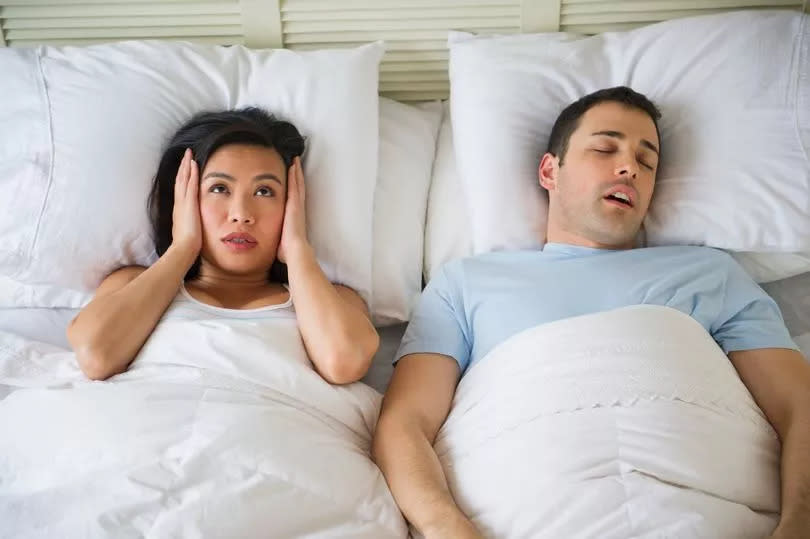People say 'mouth taping' can put an end to snoring and bad breath

People are taping their mouth shut at night as part of the latest health trend doing the rounds. Many claim it helps them sleep better and avoid snoring during the night.
The process involves using a specific type of tape to cover both the upper and lower lips before bedtime, making it difficult to open the mouth. Medical expert Dr Jess Andrade, known as @DoctorJesss on TikTok, explained that 'mouth taping' is designed to "promote breathing through your nose while you sleep", rather than through your mouth.
The goal is to enhance sleep quality and tackle the perennial issue of snoring. It is also claimed to help prevent bad breath.
However, the paediatric doctor emphasised that this technique is not suitable for everyone. She advised against trying it if you have any pre-existing respiratory conditions or feel anxious about the idea without first consulting a medical professional, reports the Mirror.
What causes snoring?
Snoring is caused by the rattling and vibration of tissues near the airway at the back of the throat. During sleep, these muscles relax, causing the airway to narrow. The act of breathing in and out can cause the tissues in the throat to vibrate, producing the sound we know as snoring.
Some individuals are more susceptible to this due to the size and shape of their neck muscles and tissues. In other instances, excessive relaxation of the tissue or constriction of the airway can result in snoring.
The NHS identifies obstructive sleep apnoea (OSA) as a condition that can cause nocturnal breathing difficulties. This fairly common condition occurs when the throat walls relax and narrow or close during sleep, disrupting normal breathing patterns. This disruption can lead to fragmented sleep, which can significantly affect your quality of life, primarily by causing excessive daytime sleepiness.
Symptoms of OSA may include:
being very sleepy during the day
breathing pauses through the night – this may be noticed by a partner, friend or relative
loud snoring
noisy and/or laboured breathing
repeated periods where breathing stops or is interrupted by gasping or snorting
During an episode, the brain, triggered by oxygen deprivation, will rouse you from deep sleep into a lighter sleep or wakefulness, allowing your airway to reopen and restore normal breathing. These frequent sleep disruptions can leave you feeling extremely tired and increase the likelihood of daytime drowsiness.
As these breathing interruptions are typically not remembered, you may be unaware of any problem. If you suspect you have OSA, it is crucial to consult a doctor. Having OSA can heighten your risk of developing certain conditions, such as:
developing high blood pressure (hypertension)
having a stroke or heart attack
developing an irregular heartbeat – such as atrial fibrillation
developing type 2 diabetes – although it’s unclear if this is the result of an underlying cause, such as obesity
But does mouth taping actually help?
The Sleep Foundation has confirmed that there is some truth to this online trend. A study of people with mild obstructive sleep apnoea showed that wearing a patch over the mouth led all participants to breathe through their noses, altering the angle of the palate and tongue.
These changes resulted in significantly less snoring and fewer instances of interrupted breathing. Advocates for mouth taping suggest it could help mitigate the adverse effects associated with mouth breathing, including:
Sleep-disordered breathing
Dry mouth
Cavities
Gum disease
Bad breath
What are the potential side effects?
The full range of side effects from mouth taping hasn't been thoroughly researched yet, but anecdotal reports include:
Irritation on or around the lips
Pain when ripping off the tape, especially for those with facial hair
Disrupted sleep due to irritation from the tape or difficulty breathing through the nose
Anxiety, for those who feel uncomfortable having their mouth taped shut
Discomfort or difficulty breathing
How can I do this safely?
If you're considering giving mouth taping a go, ensure you use a porous tape designed for use on human skin. Using masking tape or any other type not intended for body use could potentially cause irritation or an allergic reaction.
There are companies that sell adhesive strips specifically designed for mouth taping during sleep. Most pharmacies also stock hypoallergenic tape, surgical tape, and athletic tape, which are porous and commonly used on human skin.
Before attempting mouth taping for sleep, it's advisable to test the mouth strips during the day. If you have difficulty breathing through your nose due to allergies, nasal polyps, or another reason, you should avoid mouth taping.
If you regularly suffer from poor sleep or if you've been told you snore excessively or your breathing stops and starts at night, consult your doctor.
Are there any other ways to stop myself snoring?
If 'mouth taping' seems a bit extreme, there are plenty of methods that have been suggested by the NHS that don't involve going to great lengths. One suggestion is to sleep on your side because positioning yourself like this can help the airways stay open to reduce snoring and alleviate mild apnoea.
If you're concerned you'll roll back over and start snoring, the NHS website suggests taping or stitching a tennis ball to the back of your sleepwear. You could also buy a special pillow or bed wedge to help keep you on your side.

 Yahoo News
Yahoo News 
